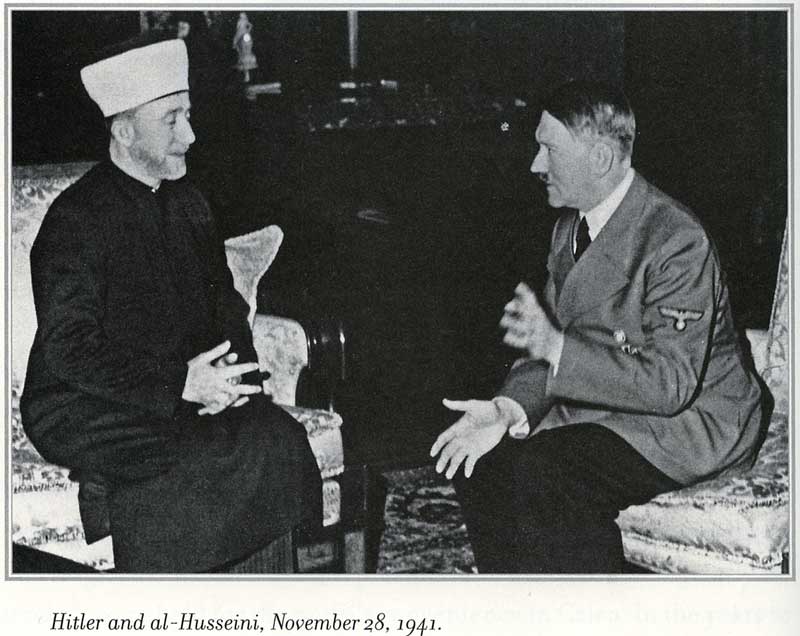'Palestine's efforts against Nazi Germany are a deep-rooted part of our history,' Erekat says https://t.co/uV9TdzCTLk #BreakingNews— The Jerusalem Post (@Jerusalem_Post) October 21, 2015
[Al Husseini's] opposition to the British peaked during the 1936–39 Arab revolt in Palestine. In 1937, evading an arrest warrant, he fled Palestine and took refuge in, successively, the French Mandate of Lebanon and the Kingdom of Iraq, until he established himself in Fascist Italy and Nazi Germany. During World War II he collaborated with both Italy and Germany by making propagandistic radio broadcasts and by helping the Nazis recruit Bosnian Muslims for the Waffen-SS. On meeting Adolf Hitler he requested backing for Arab independence and support in opposing the establishment in Palestine of a Jewish national home. At war's end, he came under French protection, and then sought refuge in Cairo to avoid prosecution.
[...]
Al-Husseini arrived in Rome on 10 October 1941. He outlined his proposals before Alberto Ponce de Leon. On condition that the Axis powers 'recognize in principle the unity, independence, and sovereignty, of an Arab state, including Iraq, Syria, Palestine, and Transjordan', he offered support in the war against Britain and stated his willingness to discuss the issues of 'the Holy Places, Lebanon, the Suez Canal, and Aqaba'. The Italian foreign ministry approved al-Husseini's proposal, recommended giving him a grant of one million lire, and referred him to Benito Mussolini, who met al-Husseini on 27 October. According to al-Husseini's account, it was an amicable meeting in which Mussolini expressed his hostility to the Jews and Zionism.
Back in the summer of 1940 and again in February 1941, al-Husseini submitted to the Nazi German Government a draft declaration of German-Arab cooperation, containing a clause:
Germany and Italy recognize the right of the Arab countries to solve the question of the Jewish elements, which exist in Palestine and in the other Arab countries, as required by the national and ethnic (völkisch) interests of the Arabs, and as the Jewish question was solved in Germany and Italy.Encouraged by his meeting with the Italian leader, al-Husseini prepared a draft declaration, affirming the Axis support for the Arabs on 3 November. In three days, the declaration, slightly amended by the Italian foreign ministry, received the formal approval of Mussolini and was forwarded to the German embassy in Rome. On 6 November, al-Husseini arrived in Berlin, where he discussed the text of his declaration with Ernst von Weizsäcker and other German officials. In the final draft, which differed only marginally from al-Husseini's original proposal, the Axis powers declared their readiness to approve the elimination (Beseitigung) of the Jewish National Home in Palestine.
[...]
In December 1942, al-Husseini held a speech at the celebration of the opening of the Islamic Central Institute (Islamische Zentralinstitut) in Berlin, of which he served as honorary chair. In the speech, he harshly criticised those he considered as aggressors against Muslims, namely "Jews, Bolsheviks and Anglo-Saxons." At the time of the opening of the Islamic Central Institute, there were an estimated 3,000 Muslims in Germany, including 400 German converts. The Islamic Central Institute gave the Muslims in Germany institutional ties to the 'Third Reich'.
Let's be clear: Palestinian Grand Mufti Haj Amin al-Husseini was a Nazi collaborator who helped exterminate Jews. pic.twitter.com/x2QkaVq8R3
— Avi Mayer (@AviMayer) October 22, 2015

